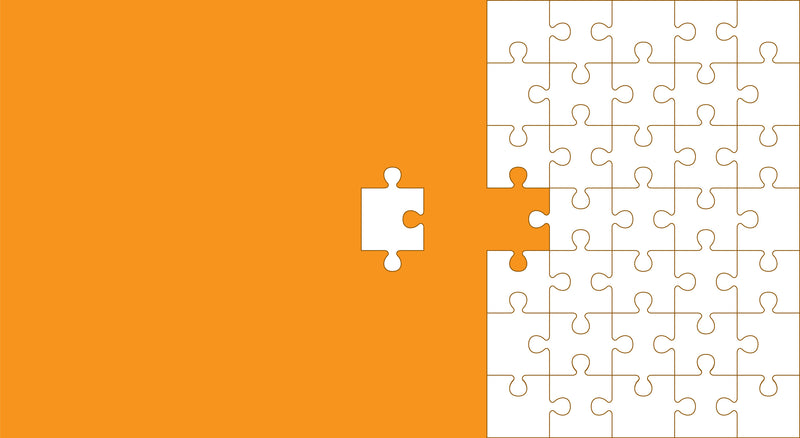Jigsaw puzzles are more than just a leisurely pastime; they provide profound mental health benefits. Whether you're looking to relieve stress, combat anxiety, or improve focus, the humble puzzle offers a therapeutic outlet for your mind. Here’s how incorporating puzzles into your routine can have lasting mental health benefits.
Stress Reduction and Mindfulness
One of the immediate advantages of working on puzzles is the way they reduce stress. The focus required to fit pieces together encourages a meditative state, where your mind disengages from anxious thoughts and fixates on a single, soothing task. This process helps calm the nervous system and lowers cortisol levels, the hormone linked to stress (NeuroLaunch.com). By focusing on the task at hand, puzzling helps you practice mindfulness, a key element in managing anxiety and depression (Toward Self Care).
Boosting Mood and Alleviating Depression
Puzzles offer a sense of achievement and accomplishment, which is crucial for those dealing with depression. Each piece you fit into place releases dopamine, a neurotransmitter that enhances feelings of pleasure and motivation. Completing a puzzle, even over a longer period, offers a tangible goal that can uplift your mood and give you a renewed sense of purpose. Additionally, creative engagement through puzzling can serve as a non-verbal outlet for emotions, particularly for those who struggle to articulate feelings.
Enhancing Cognitive Function
Working on a jigsaw puzzle simultaneously engages both hemispheres of the brain. While the left hemisphere focuses on logic and order, the right taps into creativity and spatial awareness. This dual engagement not only sharpens memory and attention to detail but also improves problem-solving skills. Over time, regular puzzling can even reduce the risk of cognitive decline associated with aging, such as dementia(
Combatting Loneliness and Fostering Social Connections
Puzzles are an excellent solo activity, but they can also be highly social. Working on a puzzle with family or friends fosters cooperation and communication. In group settings, puzzles provide a shared goal and promote bonding, making them perfect for those who may feel isolated. For solo puzzlers, online puzzle communities offer opportunities to share progress and connect with others, helping to build a sense of belonging.
The Power of Puzzle Imagery in Mental Health
While all jigsaw puzzles can be beneficial for mental wellness, the choice of imagery plays a significant role in maximizing the calming and restorative effects. Research on color psychology and mental health suggests that certain images and color palettes can either stimulate or relax the mind. For example, puzzles featuring calming scenes, such as serene landscapes, oceans, or nature, often incorporate cool colors like blues and greens, which are known to promote tranquility and reduce anxiety. (The Psychology of Colors)
Images with greens and blues, like forest or beach scenes, are excellent for promoting a meditative, stress-relieving experience. Blue, in particular, has been shown to help reduce stress and create a sense of peace, while green offers a strong connection to nature and can aid in lowering anxiety. On the other hand, bright, warm colors like red or orange, though stimulating, may be better suited for puzzles aimed at boosting energy and mood, rather than relaxation. (Wellness Blessing)
For those dealing with mental health challenges like depression or chronic stress, selecting puzzles with peaceful, serene themes may enhance the therapeutic effect by helping to create a positive, calming mental environment.
Themes That Promote a Positive Mindset
Certain puzzle themes can also promote a positive mindset by evoking feelings of joy, inspiration, or adventure. Travel-themed puzzles, featuring iconic global landmarks or picturesque destinations, can spark a sense of exploration and excitement. They might also encourage daydreaming about future adventures, offering a mental escape that can be uplifting.
Additionally, themes of serenity—like sunsets, tranquil waters, or peaceful wildlife—can help reinforce a sense of calm. Ocean scenes, in particular, are known for their association with relaxation and mindfulness. In contrast, puzzles that showcase inspirational or motivational images, such as quotes or uplifting artwork, can help reinforce positive thinking, making them ideal for individuals looking to boost their mood. (Mind Help)
Ultimately, while all jigsaw puzzles can support mental wellness, those with thoughtful imagery and themes designed to evoke calm or inspiration may offer enhanced mental health benefits. Choosing puzzles that resonate with personal preferences—whether serene landscapes or energizing colors—allows individuals to tailor their puzzling experience to their mental health needs.
Conclusion: A Simple Path to Better Mental Health
Jigsaw puzzles are a powerful tool for mental wellness, offering a blend of relaxation, cognitive engagement, and emotional healing. Whether you're seeking stress relief, cognitive improvement, or a way to foster social connections, puzzles provide a low-cost, accessible solution. By choosing images and themes that resonate—such as calming ocean scenes or inspiring travel destinations—you can further enhance their therapeutic benefits. The right puzzle not only entertains but also contributes to mental clarity, emotional balance, and a positive mindset. So, next time you're feeling overwhelmed, consider sitting down with a puzzle and let it guide you toward calm and focus.
Resources:
- Neuro Launch - Mental Health library with thousands of in depth articles on psychology, neuro science and mental well-being
- Toward Self-Care - Learn how to make self-care a way of life!
- The Psychology of Colors - How colors affect our mood.
- Wellness Blessing - How Jigsaw Puzzles are Great for Mental Wellness+
- Mind Help - Mental Health Expert, Well-being Community, and Wellness Center.



